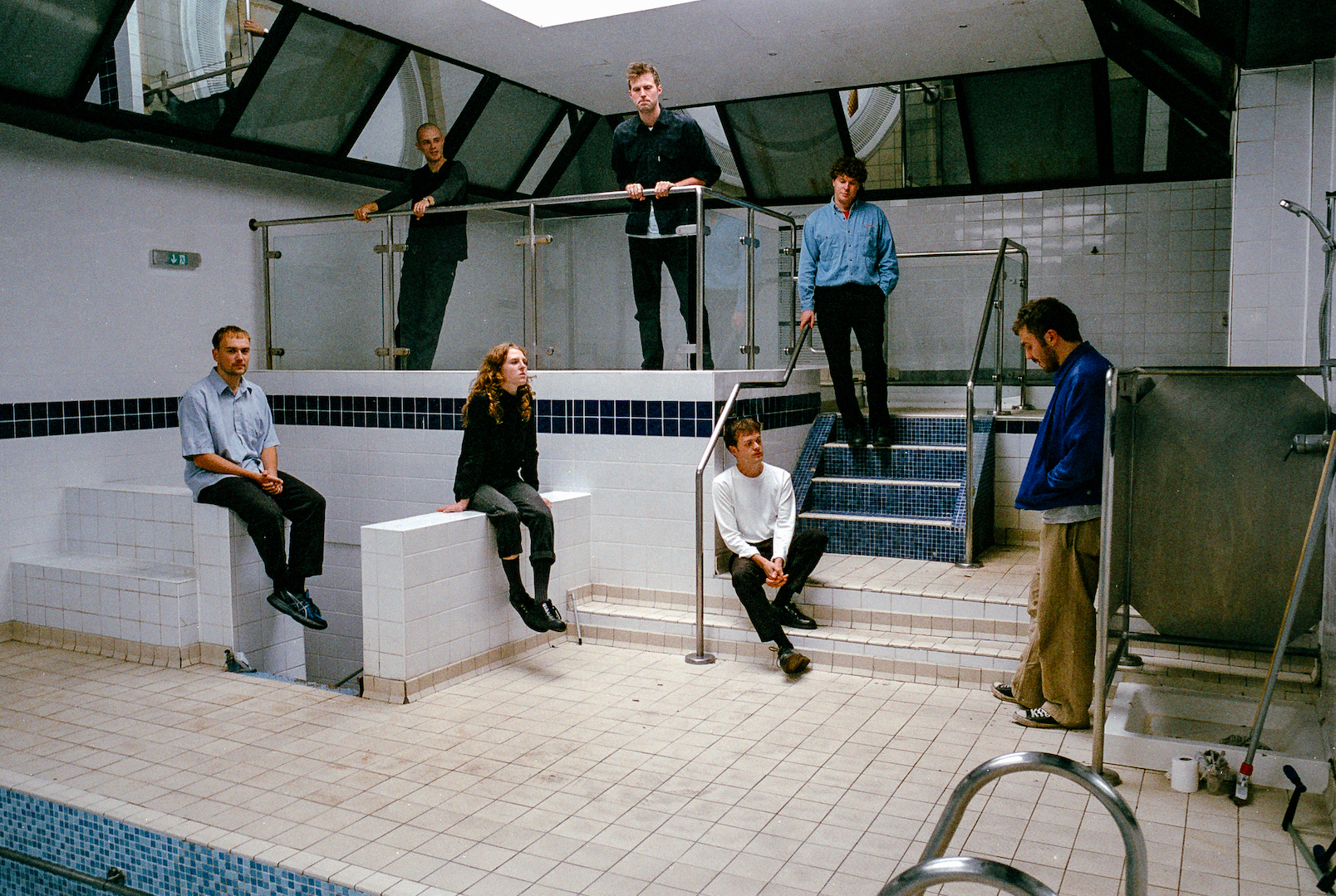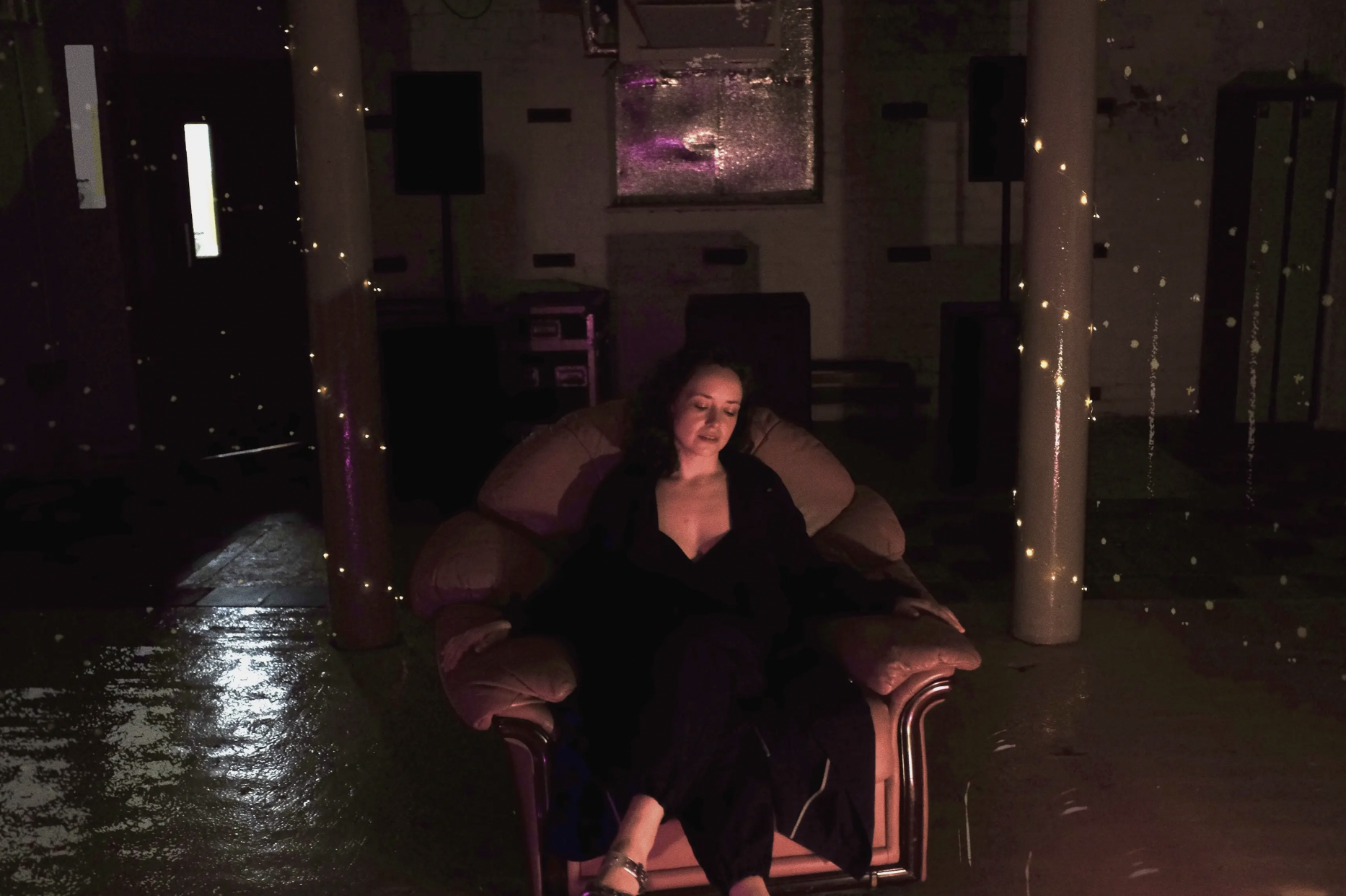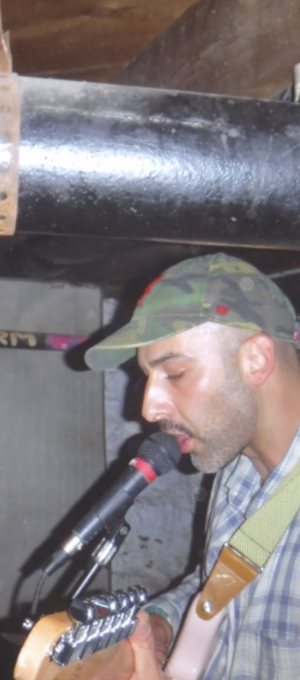TMR TALKS TO...
CAROLINE
In this interview feature, we get to know the most radicalist up and coming stars on the planet.
This time, we opened the lid on minimalist sonic-explorers caroline.
Recently joining the Rough Trade roster, which includes acts such as Girl Band, black midi and Goat Girl, caroline are an ever-evolving breath of fresh air. Unafraid to experiment with sounds and textures, their drawn-out compositions touch on the band's shared influences and experiences of playing midwestern 'emo' guitar music, Appalachian folk, minimalist classical and various forms of dance music.
Meticulously deconstructing and rebuilding their pieces to a place that they're happy with at the time, we wanted to learn more about this fascinating new outfit, whose minimal output so far has truly stolen our hearts.
***
TMR: There's currently very little info out there about you guys, but we managed to learn that caroline began as a three piece consisting of Jasper Llewellyn, Mike O'Malley and Casper Hughes in early 2017. Since then the band has grown exponentially into an 8 (or 9?) piece project. Can you tell us more about how you met and how the band evolved?
Mike: me and Jasper met when we were teenagers and often played country or old folk songs together, practicing singing in harmony etc. Jasper moved to Manchester for a while and met Casper there, everyone eventually moved to London and I started to join in with weekly practice sessions that Jasper and Casper would have where they would play through their ideas together. they were sort of long improvised sessions where we’d play the same thing repetitively for hours. once songs actually started to settle and form we wanted more textures to feature, so more people ended up joining the band, some were old friends since we were teenagers or from Manchester, and others newer friends that we knew from other bands. it’s usually 8 people performing live but can sometimes be more depending on which songs we’re playing that evening.
TMR: From what we've heard so far repetition seems like an important factor in your songwriting process. Can you tell us more about that?
Mike: it definitely is, it feels like the right thing to do with the melodic ideas we have most of the time. i feel like when listening to other people's songs in the past, I’ve sometimes wished the song was just one specific 30 second section looped for 10 minutes, rather than featuring a chorus, a bridge etc. so it’s nice to be able to do that in a band setting. also it makes a lot of sense with our influences, casper has always listened to a lot of dance music and me and jasper always liked folk music especially which can just be verses and chord sequences going round and round forever. it’s nice to witness an idea develop in real time over a seemingly stretched out period of time.
TMR: Layering also feels like something that you've mastered. How do you balance the more delicate, acoustic instruments with the louder elements of your band, like electric guitar, bass and drums?
Mike: one of the main parameters we talk about when we’re writing is leaving good amounts of ‘space’ for things, so it’s a priority that everything always has it’s rightful place as a texture, and everything is being ‘used’ effectively. the acoustic instruments (violins / cellos / trumpet / clarinet etc) can be pretty loud though if they want to be, even if they’re not plugged in.
TMR: Intriguingly your dedication to improvisation echoes the approach of experimental pioneers CAN or perhaps, more recently that of your noisy new label mates black midi, but you couldn't sound more different. Are there any artists that you've been directly influenced by?
Casper: Both great bands, but yeah, as you say, we’re very different! Our relationship with improvisation is at a fairly early stage. The vast majority of the music we play live is ‘written’ in quite a precise way, but we do have sections in certain songs where we allow space for improvisation. I kind of see our music is very much of a mixture of that precision with more anarchic, improvised moments that cut across.
Mike: In terms of artists we’re influenced by…. There are loads! We’ve all listened to so much music that it’s hard to pick stuff out that is especially influential. Let’s go with: Aerial/Papa M, Dirty Three, Low, Phil Elverum, Mark Hollis. I think the artists listed are the ones we’ve collectively listened to/talked about the most over the last few years.
TMR: We heard on the grapevine that you recently worked with the wonderful folk singer and ex-Goat Girl member Naima Bock. How did that come about and is collaborating with other artists something that you're interested in?
Casper: We were looking for a female vocalist for some group vocals we were recording and our manager Josh knows Naima. It was great having her along.
Mike: I think we’d definitely be up for collaborating with other artists. Most of us already get together to play and improvise with other musicians. We have a regularish thing we do at our studio and we’ve started to play live as well. We put something on at DIY space in Peckham which culminated in 25 people sitting in a circle and doing an improvised singing session for about an hour. It was incredibly messy, very weird, sublimely beautiful at times - but was also intensely stupid and funny in a Rainbow Rhythms kind of way. Definitely something we’ll do again. Thanks to Nathan Piggot and Jasp for organising!
TMR: The live rendition of 'Dark Blue', that was filmed and performed in a drained out swimming pool, was a really beautiful introduction to your music. Can you tell us where this idea came from?
Casper: Our drummer Hugh has a studio in the same building. It is a cool space and the acoustics are incredible. To be honest, the idea wasn’t much more thought out than that. It’s not often that you have access to a building with an empty swimming pool in it - so we thought we’d make the most of it.
Mike: It’s a bit random in a way. I think we’re generally against doing performances in quirky places for the sake of it as it can come across as a bit of a stunt; but the acoustics in there are so amazing that it made it worthwhile. We’re also really pleased with how the video turned out. A big thank you to Jack Taylor Gotch and Georgie Curran for their work on it. The second half of the session is due to be released in the next couple of months.
TMR: Of course swimming pool's have a very distinctive and recognisable sound, which I'm sure you were aware of when you decided to play there. Do you put a lot of consideration into the kind of environment that you choose to make music in and do you think it has an impact on your playing?
Casper: Yeah, definitely. We generally try to think very carefully about our live setup - the venue we play at and how we configure ourselves in relation to the audience. We tend to practice and write in a circle facing one another - to be as responsive as possible - and so we try and emulate that when we play live.
Mike: The ideal scenario is playing in a hall with us in a circle in the middle facing one another and with the audience encircling us. No stage preferably. People should be free to sit or stand. We try and light the room in a way that makes it feel homely and welcoming rather than austere.
I think we’re generally a little bored of the form that most gigs take and are in the process of experimenting with different ways of presenting our music. It’s still very much a work in progress but we believe it’s important to think about the music as not something that is separate from the way in which it is presented and the environment in which people listen to it.
The best dance music nights I’ve been to are the ones where the most care is taken over the sound system, the lighting, the dancefloor - and of course the selection. The right vibe is something that needs to be worked on! We’re still working on ours but I definitely think we’re in the process of creating something good.
TMR: Speaking of which, if you could create the perfect environment to listen to your music in what would it be?
Jasper: I guess, as we’ve said above, we’ve begun to think quite a bit about how our music is presented live, which is both about where/how we perform it and where/how people listen to it.
Mike: In terms of listening outside of live performances, this is something that is quite new for us as we haven’t really had much recorded until recently, and none of that has been available for people outside of the band to listen to until even more recently than that (with the ‘Dark blue / BRJ’ single release).
TMR: We've probably all had a little more time on our hands to listen to music as of late so we'd love to know if there's any interesting emerging artists you've been checking out lately?
Jasper: I guess its always hard to say what defines an artist as ‘emerging’ but I suppose people like UH, Kiran Leonard, Still House Plants (sorry no Facebook yet) come to mind. They have all been playing for different lengths of time but are all doing really interesting and original things. Fionnuala from UH and Kiran are good friends of ours and we’ve played a few shows together.
TMR: We've found your music a calming influence through the uncertain times that we're currently facing, so thank you for that. Is there anything you guys do to unwind or that's helping you cope?
Jasper: We’ve actually been working on quite a few different music projects, using Zoom and things like that which have been keeping us busy. We’ve been trying not to see these projects as too much like work and more just for the sake of experimentation and sustaining some sort of collective musical experience.
Mike: We all do various different things outside of caroline (PHD student, freelance journalism) so some of those things are still continuing. I know that a couple of us are really getting into gardening too!
TMR: With the rest of 2020 seemingly hanging in the balance for musicians, how are you planning on spending your time over the next few weeks/months?
Jasper: We have a few different musical projects to finish and still have loads of little bits of recording + mixing to do for the album that we can get on with in isolation. We are also looking at how some of our plans for live shows can be readapted into virtual events.
Mike: We are still writing and sharing little musical ideas with each other. Hopefully some of these will develop into things that can be properly explored when we are all back in our studio. Whenever that might be.
***
'Dark Blue' and b-side 'BRJ' are available via 12" with a hand-drawn insert here now.
-Holly Mullineaux




